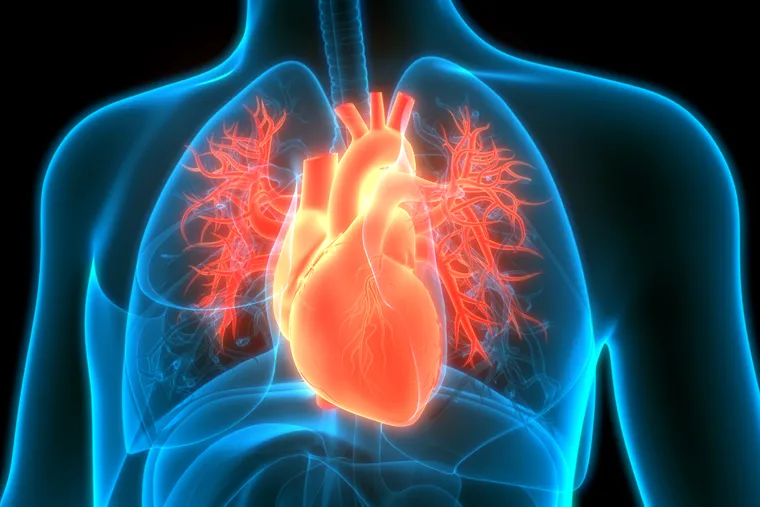Aging can affect the heart’s ability to pump blood but it can’t provoke heart failure in adults. Congestive heart failure is a condition in which muscles of the heart weaken as ventricles change their size and thickness disturbing the functioning. Commonly, fluid retention is the first clear indication of a heart condition, especially seen in the lungs, abdomen, and legs when chambers of the heart (ventricles) can’t contract or relax in the normal way they should.
One of the main causes of congestive heart failure includes high blood pressure, myocardial infarction, coronary heart diseases, abnormal heart rhythms, heart valve diseases, etc. Our irregular lifestyle is mainly responsible for increasing the risk factors for heart attacks and stroke.
While high cholesterol levels and physical inactivity remain the topmost contributing factors to heart failure, smoking and excess alcohol intake create irreversible complications for any individual.
Symptoms of heart failure
Initially, the symptoms of congestive heart failure aren’t alarming and the likelihood of taking the signs for other medical conditions is quite obvious. In younger people, the chances of not finding any signs can occur too! Even today, the maximum cases of congestive heart failure are noticed in adults. In rare cases, children with congenital heart diseases have the risk of heart failure in the future.
Symptoms to look out for;
- New or worsening shortness of breath
(especially during or after physical activity, or waking in the between the sleep)
- Sudden or fast weight gain (more than 2kg per week)
- Muscular fatigue/ chronic tiredness
- Difficulty lying flat at night
- Abdomen swelling
- Swelling of ankles or legs
- Dizziness
- Heart palpitations
- Fainting or passing out
- Constipation
- Loss of appetite
- Unexplained coughing
- Chest pain or discomfort in the upper body
Diagnosis of heart failure
Having heart failure is traumatizing, but what is more dangerous is not getting a timely diagnosis. However, there is no particular test to detect heart failure. A set of medical detection is ordered, including considering the patient’s medical history, family history, a physical examination, and results of screenings.
Heart failure can be detected with a variety of tests;
- Chest x-rays
- Electrocardiogram (EKG)
- Echocardiography (ultrasound of the heart)
- Exercise Stress Test
- Holter Monitor
- Lung Function Tests
- Angiography (procedure to look for blockages in the heart)
- Other Blood Tests.
Prevention
In this fast-paced life, every one of us is suggested to control the risk factors leading to cardiac diseases. It is true that we can reduce or even eliminate the factors resulting in heart failure such as uncontrolled blood sugar levels, high blood pressure, or being overweight. Lifestyle changes and adhering to prescribed medications can go a long way in preventing heart failure.
Some of the recommended ways include;
- Eating a healthy diet
- Drinking adequate water
- Getting enough sleep
- Involving in physical activity
- Maintaining a healthy weight
- Reducing stress
- Limiting alcohol intake
- Quitting smoking
Treatment
If you are looking for a permanent cure for heart failure, it could be a bit disappointing as you can relieve symptoms but cannot reverse the damage. Treatment for congestive heart failure can vary with age, progression, stage, and type of heart failure. Generally, a cardiac surgeon first looks out for underlying conditions such as diabetes, hypertension, arrhythmia, and others. Based on these factors, a treatment plan is decided. Some of the common treatments include;
- Lifestyle changes – You may be advised to avoid eating excessive salt and control caffeine intake (to control fluid retention). Adding a healthy diet, regular exercise, maintaining adequate hydration, losing excess body fat, restricting alcohol, and quitting smoking are advised to limit the damage.
- Medicine – A range of medicines can help, including diuretics, ACE inhibitors, aldosterone blockers, or certain beta-blockers are advised to manage the underlying condition triggering heart failure.
- Insertion of implanted cardiac devices in the chest that helps in controlling the heart rhythm.
- Surgery is performed to replace narrowed or leaking heart valves. In some extreme cases, coronary bypass surgery or a heart transplant is the last resort. Monitoring the condition of heart health will usually be needed for life.
Once the treatment begins, you may need to work hard to stick to lifestyle changes. Keeping an eye on bodily changes such as swelling in ankles and legs or weighing daily to check fluid retention is necessary. Anxiety or depression is quite obvious after acknowledging heart failure, however, managing stress is highly important to leading a long and productive life.
If you have been diagnosed with heart failure or are experiencing any of the symptoms, do not delay and contact your doctor promptly. At Prakash Hospital, get the best expertise from the leading cardiologists committed to delivering appropriate treatment and bringing people back to their lives faster and stronger.



Recent Comments